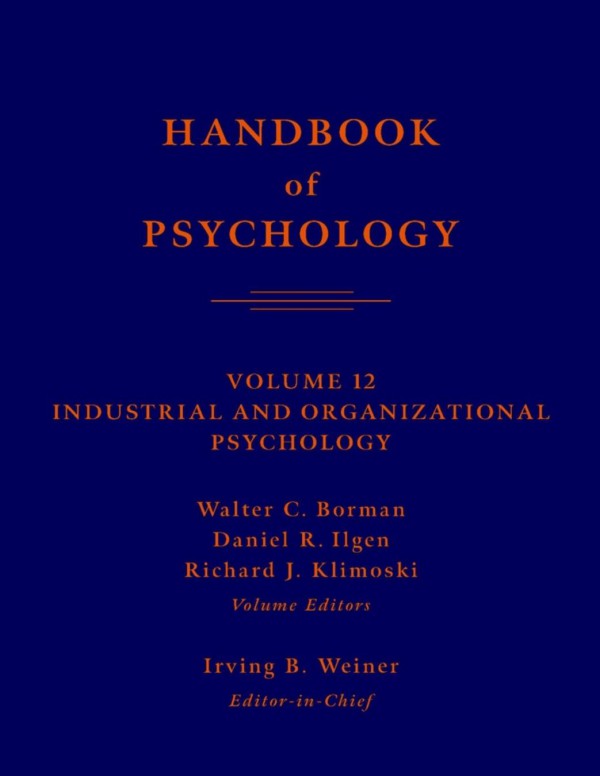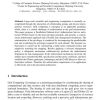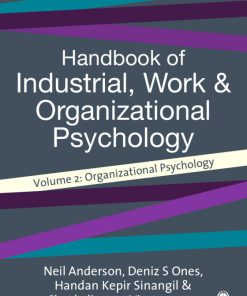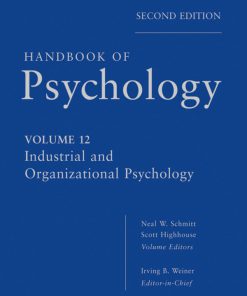Handbook of psychology Volume 12 Industrial and organizational psychology 2nd Edition by Walter Borman, Daniel Ilgen, Richard Klimoski, Irving Weiner ISBN 9781118285398 1118285395
$50.00 Original price was: $50.00.$25.00Current price is: $25.00.
Authors:Walter C. Borman, Daniel R. Ilgen, Richard J. Klimoski, Irving B. Weiner , Series:Psychology [68] , Tags:Psychology / General , Author sort:Walter C. Borman, Daniel R. Ilgen, Richard J. Klimoski, Irving B. Weiner , Languages:Languages:eng , Published:Published:Feb 2007 , Publisher:Wiley , Comments:Comments:Includes established theories and cutting-edge developments.Presents the work of an international group of experts.Presents the nature, origin, implications, an future course of major unresolved issues in the area.
Handbook of psychology Volume 12 Industrial and organizational psychology 2nd Edition by Walter Borman, Daniel Ilgen, Richard Klimoski, Irving Weiner – Ebook PDF Instant Download/Delivery. 9781118285398 ,1118285395
Full download Handbook of psychology Volume 12 Industrial and organizational psychology 2nd Edition after payment
Product details:
ISBN 10: 1118285395
ISBN 13: 9781118285398
Author: Walter Borman, Daniel Ilgen, Richard Klimoski, Irving Weiner
Handbook of psychology Volume 12 Industrial and organizational psychology 2nd Edition Table of contents:
Part I Conducting and Communicating Research in Industrial–Organizational Psychology
Chapter 1 A Snapshot in Time: Industrial–Organizational Psychology Today
“I” Versus “O” Tension
Psychology Versus Business Tension
Science Versus Practice Tension
Conclusion
References
Chapter 2 Inferential Meta-Themes in Organizational Science Research: Causal Inference, System Dynam
Causal Inference
Dynamic Modeling
Examples
Summary of Linear Dynamic Systems
Computational Modeling
Conclusions
References
Appendix
Chapter 3 Communicating Research Findings
Communicating Research Findings
What to Say: Alternatives to Correlations
What to Show: Graphical Solutions and Data Displays for I-O Psychology
General Rules and Ideas for Good Graphical Display
Conclusions
References
Part II Personnel Psychology
Chapter 4 Job and Work Analysis
Overview: Job Analysis Requires Many Choices
Job Analysis Methods Must Align With Purpose: One Size Does Not Fit All
From the Dictionary of Occupational Titles to the O*NET
Job Analysis for Identifying Personality Dimensions Relevant to Job Performance
Competency Modeling
Cognitive Task Analysis
Strategic Job Analysis
Accuracy in Job Analysis
Conclusion
References
Chapter 5 Job Performance
What Is Job Performance?
Behavioral Dimensions of Job Performance
Antecedents of Job Performance
References
Chapter 6 Recruitment and Job Choice Research: Same as It Ever Was?
Recruitment Context
Recruitment Practices and Procedures
Recruitment Processes
Taking Stock and Looking Ahead
Concluding Remarks
References
Chapter 7 Personnel Selection and Employee Performance
Performance Model
Theories of Job Performance and Job Analysis
The Nature of Performance
Proximal Antecedents of Performance: Declarative Knowledge, Procedural Knowledge and Skills, and Mot
Antecedents and Outcomes of Declarative Knowledge, Procedural Knowledge and Skills, and Motivation
Individual Difference Correlates of Knowledge, Motivation, and Performance
Methods of Measurement
Methodological Issues and Potential Moderated Relationships
Distal Outcomes of the Selection Process and Employee Performance
Societal and Organizational Issues
Conclusions
References
Chapter 8 Intelligence and the Workplace
General Mental Ability
Intelligence and Performance
Social and Emotional Intelligence
Fallacies and Misinformation About Intelligence
Conclusions
References
Chapter 9 Use and Importance of Personality Variables in Work Settings
Use and Importance of Personality Variables in Work Settings
Structure of Personality
Models of Determinants of Work Performance
Construct Validity of Personality Variables
Synthetic Validity
Ethnic, Gender, and Age Group Similarities and Differences
Methods of Measuring Personality Variables
Intentional Distortion
Summary and Path Forward
References
Chapter 10 Understanding and Facilitating Learning: Advancements in Training and Development
Overview
Training Needs Assessment
Training Design and Delivery
Technology-Delivered Instruction
Team Training
Training Methods
Transfer of Training
Training Evaluation
Special Topics
Final Comments
References
Chapter 11 Absence, Lateness, Turnover, and Retirement: Narrow and Broad Understandings of Withdrawa
Introduction and Background
Withdrawal as a Behavioral Category
Work Withdrawal
Job Withdrawal
Conclusion
References
Chapter 12 Theoretical Approaches to the Study of Job Transitions
Theoretical Approaches to the Study of Job Transitions
Theoretical Foundations of Job Transitions Research
New Approaches to Understanding Job Transitions
Directions for Future Research
References
Part III Organizational Psychology
Chapter 13 Motivation
Overview of Goals and Goal Processes
Expectancies, Self-Efficacy, and Related Constructs
Affect
Individual Differences Related to the Self and Personality
Temporal Dynamics
Multiple Goals and Decision Making
Discussion
References
Chapter 14 Job Attitudes: Cognition and Affect
The Facet Versus Global Approaches to Job Satisfaction
Antecedents to Job Satisfaction
Consequences of Job Satisfaction
Measuring Job Satisfaction
Directions for Future Research
Conclusion
References
Chapter 15 Leadership Models, Methods, and Applications: Progress and Remaining Blind Spots
Catching Up With the Field of Leadership
Emerging and Current Areas of Exploration
General Conclusions
References
Appendix
Chapter 16 Organization Change and Development: In Practice and in Theory
Organization Development Today, Not Yesterday
The Conceptual Knowledge of Organization Development
Samples of Contemporary OD Interventions
Implementation Theories
The Implementation/Change Process Theory Connection
The Change Process Theory/Implementation Theory Divide
Conclusion
References
Chapter 17 Work Groups and Teams in Organizations
Work Groups and Teams in Organizations: Review Update
The Nature of Work Teams and Groups
Team Composition
Team Formation, Socialization, and Development
Team Effectiveness, Processes, and Enhancements
Team Leadership and Motivation
Continuance and Decline
Research Issues and Recommendations
References
Chapter 18 Customer Service Behavior
Service Attributes
Emotional Labor and CSB
Training and Socialization of CSB
Design of Customer Service Jobs
Future Research Directions
References
Chapter 19 Judgment and Decision Making
Introduction
Normative/Prescriptive Versus Behavioral/Descriptive Themes in JDM
Inference Processes
Prediction
Preferences
Deciding: Single-Choice Events
Emotion and Decision Making
Deciding: Multiple Related Events
Multiple Decision Makers
Concluding Comments
References
Part IV The Work Environment
Chapter 20 Work Design
Major Work Design Perspectives
Contextual Influences on Work Design
Characteristics of Work
Mediating Mechanisms in Work Design
Outcomes of Work Design
Work Redesign Interventions
Individual Differences in Work Design
An Integrated Work Design Framework
Tensions in Work Design
Conclusion
References
Chapter 21 Stress in Organizations
Introduction
The Stress Concept
Theories on Organizational Stress
Empirical Evidence
Stress Interventions
Overall Conclusions
References
Chapter 22 Career Dynamics
The Changing Landscape of Work and Careers
The Meaning of a Career
Career Success
Mentoring
Career Development
The Internationalization of Careers
Entrepreneurial Careers
Conclusions
References
Chapter 23 Healthy Workplaces
Healthy Workplaces
References
Chapter 24 Organizational Culture and Climate
Integrated Model of Culture and Climate
Organizational Culture
Climate
Relationship Between Culture and Climate
Moving Across Levels of Analysis
Emergence of Shared Meaning and Perceptions
Culture and Climate Change
Conclusions and Future Directions
References
Chapter 25 Diversity in Organizations
Diversity in Organizations
Defining Theories That Guide Diversity Research
Hot Topics and Unresolved Issues in Diversity Research
Conclusion
References
Chapter 26 The Work–Family Role Interface: A Synthesis of the Research From Industrial and Organiza
Work and Family Interdependencies
Work-Family Balance
Individual Differences and Work-Family
Environmental Support for Managing Work and Family
Cross-National Work and Family Research
Future Research Directions
Conclusions
References
People also search for Handbook of psychology Volume 12 Industrial and organizational psychology 2nd Edition:
ms in psychology industrial organizational psychology
ph d in psychology industrial organizational psychology
handbook of psychology industrial and organizational psychology cafescribe
psychology industrial organizational psychology
You may also like…
eBook PDF
Industrial Organizational Psychology 6th Edition by Michael Aamodt 1111782946 9781111782948












